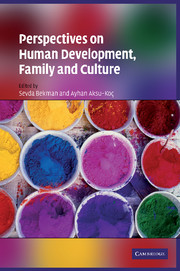Book contents
- Frontmatter
- Contents
- List of figures
- List of tables
- List of contributors
- Preface
- Foreword
- Selected international publications by Çiğdem Kağıtçıbaşı
- I Cultural and cross-cultural psychology: selected perspectives
- II Development in the family context
- III Culture and self
- IV Social change, family, and gender
- V Induced change
- 18 Adapting intervention programs for use across societies: Between valid transfer and cultural imposition
- 19 Design of culturally-appropriate developmental interventions
- 20 Designing, implementing, sustaining, and evaluating idiocultures for learning and development: The case study of the Fifth Dimension
- 21 Intervention programs to improve cognitive skills
- 22 Pro-poor approaches to using technology for human development: Monitoring and evaluation perspectives
- Epilogue
- Subject Index
- Author Index
- References
21 - Intervention programs to improve cognitive skills
Published online by Cambridge University Press: 04 August 2010
- Frontmatter
- Contents
- List of figures
- List of tables
- List of contributors
- Preface
- Foreword
- Selected international publications by Çiğdem Kağıtçıbaşı
- I Cultural and cross-cultural psychology: selected perspectives
- II Development in the family context
- III Culture and self
- IV Social change, family, and gender
- V Induced change
- 18 Adapting intervention programs for use across societies: Between valid transfer and cultural imposition
- 19 Design of culturally-appropriate developmental interventions
- 20 Designing, implementing, sustaining, and evaluating idiocultures for learning and development: The case study of the Fifth Dimension
- 21 Intervention programs to improve cognitive skills
- 22 Pro-poor approaches to using technology for human development: Monitoring and evaluation perspectives
- Epilogue
- Subject Index
- Author Index
- References
Summary
In the spring semester of 1982, I took my first class with Çiğdem Kağıtçıbaşı. She was a master communicator, meticulous and hard working, admired by even youngsters like us who were spring-struck in the beautiful surroundings of Boğaziçi University. Despite the fragrant spring, we never missed a class and my girlfriend also chose to take the class, partly because of Dr. Kağıtçıbaşı's reputation and partly because we wanted to spend less time apart. Because she was on a sabbatical the following year, I did not have the chance to work for Dr. Kağıtçıbaşı and I have resented that many times. Now, for the past twelve years, I have had the blessing to work as a colleague in the same department and on several projects together with Çiğdem Kağıtçıbaşı. Moreover, my girlfriend is my wife now and our daughter is a student taking Çiğdem Kağıtçıbaşı's class while working for her in a book project as well. We consider ourselves very lucky that she has been a part of our lives. Throughout this time, she supported and guided me in personal and career-related matters with compassion and elegance and she led me to the most exciting and meaningful projects like the Cognitive Improvement Program. It has been a privilege and I look forward to enjoying this for many more years.
As a consequence of a diverse set of reasons ranging from limited schooling opportunities to inadequacy of home environments and from lack of preschool education to low quality education, intervention programs around the world aim to improve cognitive skills of individuals in order to attain empowered populations and human capacity development.
- Type
- Chapter
- Information
- Perspectives on Human Development, Family, and Culture , pp. 350 - 366Publisher: Cambridge University PressPrint publication year: 2009

